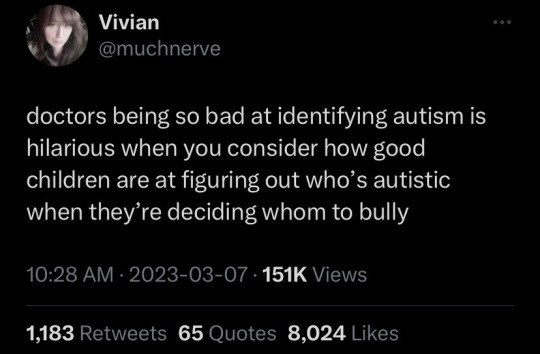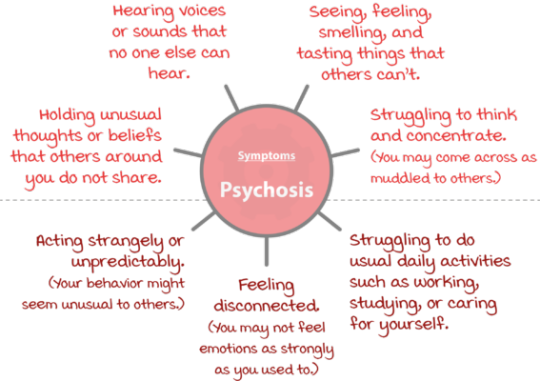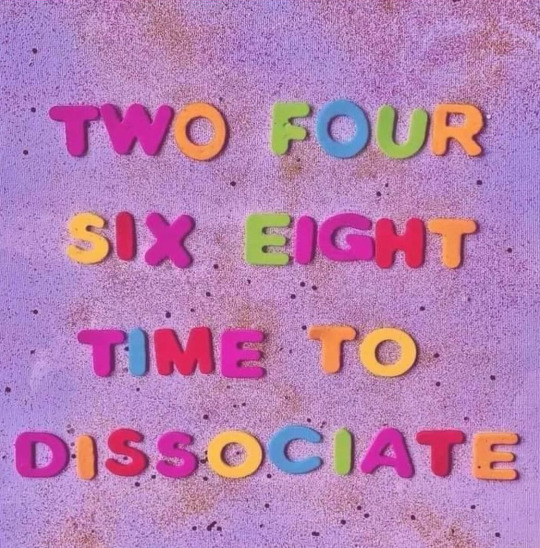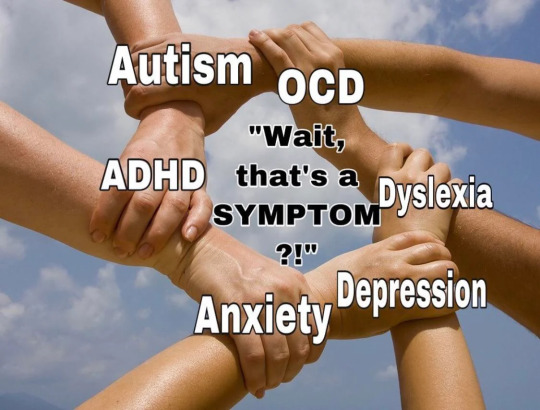#Mental Health Symptoms
Explore tagged Tumblr posts
Text
okay ajyway!! negative posting time bcuz im hashtag unwell
ME WHEN. me when i dont know whats wrong with me!!! i think sommethings wrongg but idk whaatt im losing it i thinkkk
i dont think. my zoning out should be this bad but idk what else it couldd. be??? sometimes itll get so bad that i cant function and ill just. kinda not do anythjng till i fele better
so like ill be a bit upset and then all the sudden ill start feeling a bit numb and out of it and it will keep getting worse snd a lot of the time ill start to zone out and then later ill kinda?? ‘wake up’ i guess fuc kj i dont know the words
and acftewards ill be in a different place and like the memories from when i was out of it are either so hazy that i can barely decipher what happened or theyre just. gone completely??? and then the memories from before that are always blurry but still. understandable
and then skmetimes ill like still be kinda there but i dont fully feel like me and my surroundings will be fuzzy and i dont feel fully in cotnrorllk
UGHDHEH SCREAMS INTO A PULLOW IDK WHATS WRONGG last time i tried doing research i got so confused and stressed i had to stop and now i dont reememmber any of my research FUCK 💥💥💥
#gh#vent#FROWNNN#i hate posting abt my mental issues#bcuz like#thats not anyones problem but mine!!#UGHHH SCREAMS#mental health#mental health symptoms#<- making thsi tag for me to#keep track of them
12 notes
·
View notes
Text
Identifying early signs of mental health issues is crucial for timely intervention and effective treatment. Psychiatric care services in Jersey City, New Jersey offer essential support for individuals showing early symptoms of mental health conditions. These services provide a safe space for patients to discuss their concerns and receive professional guidance, ensuring that any emerging issues are addressed promptly and effectively.
0 notes
Text
Recognizing and Addressing the Mental Health Challenges of Parents | Solh Wellness
The effects of mental illness on emotion, thought, and behaviour are felt in many facets of life. Since it is treatable, seeing a doctor is imperative. No matter what their age, gender, financial level, race, religion, or sexual orientation, anyone can acquire a mental disorder. Detection and treatment at an early stage can help people have happy lives.

Parents must address their mental health issues because parenting can be stressful. The following mental health conditions are frequently present in them:
Anxiety: A few causes of anxiety include stress due to finances, interpersonal problems, or the worry that one is not a good parent. Parents may find it difficult to remain calm and patient when their kids are anxious. The parents' persistent worry and apprehension may make it difficult for them to make decisions and concentrate on their children's needs.
Depression: It may be challenging for depressed parents to completely interact with their kids and enjoy routine activities. Depression, pessimism, and worthlessness can affect the bond between parents and children. As a result, parents could find it difficult to emotionally relate to their spouses and kids. It could also lead to harsh or negligent parenting methods.
Postpartum Depression: Some mothers may have postpartum depression after giving birth. The primary emotions linked to this condition are sadness, anxiety, and weariness. It may be difficult for the mother to care for and bond with her newborn because this illness may interrupt the mother-baby bonding process. Postpartum depression can affect a mother's ability to be emotionally present and attentive to her child's needs, which may also have an impact on the mother's overall parenting experience.
Stress: Parenting while juggling a number of obligations, such as work, finances, and domestic chores, may be very exhausting. Anxiety can cause physical and mental stress, which can interfere with a parent's ability to handle the tasks of being a parent. Stress can make people irritable, impatient, and distracted, which makes it more challenging for parents to give their kids a safe and secure atmosphere.
To be the greatest parents we can be for our kids, we need to take care of their own mental health as parents. When people tend to their emotional needs, they are able to have more satisfying interactions with their children and are better parents. Parents should prioritise their own mental health because doing so promotes the general development and happiness of their children.
So that they can care for themselves, parents can do the following:
Be honest with your kids: Being upfront and transparent with your children is essential when addressing your difficulties with mental illness, so do so. Even if you don't have to go into detail, letting them know you need help and are struggling will help them to empathise and give you more confidence.
Model healthy coping skills: Children learn by imitation, therefore as their parent, you can set an excellent example for them by demonstrating appropriate coping techniques. Teach children constructive ways to unwind, manage stress, and express their emotions. They will be able to improve their own emotional stability and resilience by exhibiting these traits.
If necessary, seek expert assistance: If necessary, seek professional assistance. In the event that managing your mental health difficulties gets difficult, don't be afraid to ask for help. Specialists in mental health, such as therapists or counsellors, can offer helpful direction and support that is catered to your requirements.
Look after yourself: Every parent should practise self-care, but those with mental health issues need to do so much more. Give getting enough sleep, eating a healthy food, and exercising frequently a high priority. Spend time engaging in rejuvenating activities.
Be patient with yourself: Be kind to yourself and, if required, seek out professional assistance. In the event that managing your mental health difficulties gets difficult, don't be afraid to ask for help. Specialists in mental health, such as therapists or counsellors, can offer helpful direction and support that is catered to your requirements.
Get a support system in place: Every parent should practise self-care, but those with mental health issues need to do so much more. Give getting enough sleep, eating a healthy food, and exercising frequently a high priority. Spend time engaging in rejuvenating activities.
Never be afraid to seek assistance: Never hesitate to ask for help; be kind to yourself. Ensure your own wellbeing. Recovery and managing one's mental health require work and patience. Be nice to yourself and understand that change might not happen right away. Maintain your commitment to getting better; eventually, you will see results.
Take breaks if you're feeling overwhelmed: If you're feeling overburdened, take breaks: Make contact with people who are knowledgeable about your disease, such as close friends, relatives, or support organisations. With the aid of a strong support network, individuals can enjoy a sense of community and have a private space in which to share their experiences.
Conclusion
You are not alone if you are a parent who is struggling with mental health issues. You can get support and tools to point you in the direction of greater physical and mental health. If you prioritise your mental health, both you and your children and family will benefit.
We at Solh feel that self-care is essential, thus we have selected a variety of effective self-help choices to improve your wellbeing. We provide a variety of services, including goal-setting, mood analysis, self-assessment tests, journaling, and access to a sizable collection of educational materials. Utilise our extensive collection of self-help resources to take control of your path to greater mental health and personal growth.
#mental health challenges#parents mental health challenges#parental depression symptoms#mental health symptoms#mental health signs
0 notes
Text
Coping with Depression: Practical Tips for Emotional Well-being
how to cope with depression? Depression can be a challenging and overwhelming condition, affecting millions of people worldwide. If you or someone you know is struggling with depression, it’s important to remember that you’re not alone. In this blog article, we will explore practical strategies to help cope with depression and improve emotional well-being. Read on to discover effective…

View On WordPress
#depression#depression symptoms#health#healthy lifestyle#mental health#mental health symptoms#rejection#stress
0 notes
Text
I see you disabled people who don't know your family medical history because your family members couldn't/wouldn't/weren't allowed to go to the doctor and never got diagnosed, or don't know your family.
I see you disabled people who didn't know you were disabled growing up, physically or mentally, maybe because your parents didn't have insurance and couldn't afford it/wouldn't take you seriously/didn't think it was a problem because they had it/doctors couldn't figure it out.
I see you disabled people who have bouts of an issue that you grew up with, that are/were infrequent enough that you never really thought about it and dealt with it on your own, and when you have one in front of people who weren't medically neglected, you wonder why they look so horrified as you describe it.
I see you disabled people who didn't/haven't had any amount of care or accommodation for their disability since it started, because you couldn't get diagnosed.
I see you disabled people who grew up thinking everyone had the same problem as you and that it was normal and so you accepted it, because you didn't understand how the human body worked and had no real frame of reference nor the language to ask for help, or the people around you saw it and just ignored it.
I see you disabled people only now understanding that what you experience is abnormal, and that there are things that can be done to help it, make it easier, or at least help you understand yourself better.
I see you disabled people that will never be able to get diagnosed or get the help you need, whether from being poor, lacking insurance, or any number of reasons.
This shit is hard, and there are people who will never quite understand your struggles. It doesn't seem to get talked about as much, but I wish it was. Please know I love you, and you aren't alone.
#Disability#Disabled#Cpunk#Mental illness#Medical neglect#Living with people who grew up going to the doctors is wild. Turns out most people don't have heart attack-type symptoms 1-3 times a year#Or blisters. Or random moments where a body part is in pain. Or any number of my health issues I may never come to understand#There would be a higher national statistic of people who are disabled if people could be diagnosed#And I swear by this.#Healthcare
2K notes
·
View notes
Text
Friendly reminder that antipsychotics don't cure schizophrenia. They don't even treat schizophrenia fully. They only treat the psychotic symptoms aka the positive symptoms. (And lots of people on antipsychotics don't have all their psychotic symptoms disappear, sometimes it only helps a little bit). Meanwhile our negative and cognitive symptoms cannot be treated fully (or at all depending on the person) with medication, and they greatly affect our lives and tend to get more severe as we age. So please don't assume that a schizophrenic person on antipsychotics is basically not mentally ill anymore cause there's a shit ton more we have to deal with on a daily basis, even if our psychosis is treated and no longer affecting us.
#schizophrenia#mental illness#nd#neurodivergent#schizophrenic#psychosis#actuallyschizophrenic#mental health awareness#pseriouslypsychotic#schizophrenia negative symptoms#schizophrenia cognitive syptoms#schizophrenia awareness#anitpsychotics#tw medication
5K notes
·
View notes
Text
I think it would really benefit people to internalize that mental illnesses are often chronic and not acute. Some of us will never be able to jump the hurdle of managing illness, much less sustaining a sense of normalcy. Many of us will never "recover," will never manage symptoms, will never even come close to appearing normal - and this is for any condition, even the ones labeled as "simple" disorders or "easy-to-manage" disorders.
It isn't a failure if you cannot manage your symptoms. It isn't a moral failure, and you aren't an awful person. You are human. There's only so much you can do before recognizing that you cannot lift the world. Give yourself the space to be ill because, functionally, you are.
#mental health#mental health advocacy#like... anxiety and depression are often concieved of as simple and easy to manage...#...but that isn't the case for so many of us. anxiety and depression just have a lot more research invested into them...#...and while i wish this were the case for literally every other condition it does alter people's perception of you to some extent...#...so while this is NOT solely about anxiety or depression it includes us...#...my anxiety and depression and PTSD have *destroyed* my life. this is chronic and will probably be life-long...#...and that isn't my fault. i've done the fucking work but guess what? that doesn't account for the fact that I Am Just ILL#the least we can do for each other is to be compassionate#be compassionate to those who cannot heal. be compassionate to the people who can't manage their lives. this world is scary enough#recognize that management of symptoms is something not all of us can do - even IF their condition is labeled as 'easy to manage'#i allowed myself to feel angry that i can't heal 'normally' and that was unfair as fuck toward myself#and i NEED people to internalize this so that MAYBE this could help somebody else who is where i was#i NEED them to understand that it's okay that they are where they are - sometimes shit just doesn't turn out how you expect or want#don't beat yourself over you being a person. you are struggling enough. you deserve to rest. just rest please#and just... give yourself space
2K notes
·
View notes
Text

#autistic pride#autistic#autism#autistic headcanon#autistic feels#autistic spectrum#autistic women#late diagnosed autistic#anti bullying#american bully#bullyworldwide#mental abuse#mental heath support#mental health#mentally exhausted#mentally tired#symptoms#mentalwellness#care#failure
3K notes
·
View notes
Text
I hate missing the people who have probably forgotten about me. I hate it because they’ve moved on or forgotten but I haven’t. I dream about the day we coincidentally meet but I can only dream so much. there needs to be a day where I come to my senses and realize no one’s coming for me, no one cares, and no one will miss me like I miss them.
#bpd stuff#actually bpd#actually mentally ill#bpd symptoms#mental problems#mentally fucked#actually borderline#borderline blog#bpd problems#bpd struggles#alone with my thoughts#mental illness#bpd#im not mentally stable#mental health#mentally unstable#delulu#delusional
1K notes
·
View notes
Text
*through tears* I BELONG HERE. ON THIS EARTH AMONG OTHERS. I BELONG JUST AS MUCH AS THE NEXT PERSON. I DESERVE TO BE ALIVE. I AM JUST AS GOOD AND BAD AS EVERYONE ELSE. I DESERVE TO BE LOVED. I DESERVE TO BE FREE.
#mental health#healing#recovery#self love#love#body neutrality#body image#depression#suicide tw#trauma recovery#trauma symptoms#traumatic childhood#trauma#cptsd recovery#cptsdhealing#complex ptsd#actually mentally ill
1K notes
·
View notes
Text
good evening everyone. remember when stede bonnet called edward teach his boyfriend. do you remember when edward teach actually fucking loved it. do you recall. wow. what a day that we have had. i love you all
#everything is beautiful#why does my mental health rely on these two men#is that normal#i have to google some symptoms#ofmd
498 notes
·
View notes
Text
Btw for anyone who needs to hear it: thinking that people are reading your mind/your thoughts are being heard by everyone is not normal. It's a symptom of psychosis and could be linked to a psychiatric disorder. This, too, goes with hallucinations.
This may seem like a no-brainer, but to teens who don't know what symptoms look like, they may jog it off for a number of reasons. I did, too, when I was in highschool! As a freshman I was having delusions/hallucinations and I didn't tell anyone because I thought they were cringe and weird. I chalked up my hallucinations to me being "tired". People who have psychosis often don't realize that what they're experiencing IS psychosis. This goes the same with other classmates/friends/loved ones. If someone comes to you with concerning behavior (even if they are joking about it) you should take note of it.
In highschool I remember a kid talking about how he could go into the matrix and he had a whole other world to protect/do missions in. He would also go still for long periods of time randomly. I thought he was weird and didn't think much of it, but those are symptoms of schizophrenia (delusions/catatonia).
I would appreciate it if this got a reblog so it could potentially help those recognize these symptoms in either themselves or others!

I wish I could have seen a post like this when I was younger. Then I could have avoided a lot of hardships and would have gotten treatment a lot sooner
#mental health awareness#i know if i saw a post like this on tumblr when i was a teenager it would have helped me out so bad#there are probably a lot of teenagers (and even adults) out there that dont realize what theyre experiencing#then they can get one step closer to a diagnosis and get treatment#it took 7 years for me to even suspect that i had bipolar disorder#i wish i had realized sooner than later that i was experiencing symptoms so i could have avoided a lot of bad experiences#due to episodes
1K notes
·
View notes
Text
Recognizing Mental Health Symptoms: A Guide to Understanding Your Well-being
In today’s fast-paced world, it’s crucial to prioritize our mental health. Yet, many people overlook the signs and symptoms of mental health issues. This blog article aims to shed light on common mental health symptoms, providing a clear understanding of how they manifest and their significance. By recognizing these signs, you can take proactive steps towards seeking support and improving your…

View On WordPress
0 notes
Text

#dissociative symptoms#dissociation#derealistion#depersonalization/derealization disorder#depersonalization#bpd#mental health#actually bpd#mental illness#bpd shit#actually borderline#bpd shitposting#bpd problems#bpd mood#bpd meme
598 notes
·
View notes
Text

NEURODIVERSE-SQUAD, ASSEMBLE!
#neurodiversesquad#adhd memes#neurodivergence#neurodiversity#neurodiverse stuff#adult adhd#adhd#autism#ocd#depression#anxiety#dyslexia#mental health#mental wellbeing#late diagnosis#undiagnosed#self diagnosis is valid#medicated#unmedicated#adhd symptoms#symptoms
925 notes
·
View notes
Text
Do any other social folks on the schizophrenia spectrum also feel like they don’t know how to “people” after an episode?
It’s so strange to look back on how social I was when my symptoms were less severe and how (almost) outgoing I was
Now I’m not even sure how to talk to close friends and am just awkward. I lost my conversation skills :(
#actually psychotic#actually schizospec#schizospec#actually schizophrenic#schizophrenic spectrum#mad pride#schizo spectrum#disability pride#schizoaffective#brief psychosis#psychotic disorders#postpartum psychosis#psychotic disorder#psychology#psychosis#schizotypal#actually stpd#actually schizoaffective#actuallyschizophrenic#actual depression#actually paranoid#actually disabled#actually nd#actually neurodivergent#neurospicy#mental health recovery#mental health community#negative symptoms#cw: negativity
120 notes
·
View notes